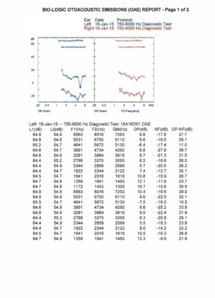Thank you all very much for your replies! I'm a bit late replying to my own thread, because I'm not on TT very much any more. I'm very depressed and rarely feel like doing anything 'social'.
On Monday I had an appointment with a 'Tinnitus Team' at a better (and more research oriented) hospital than the one I went to before. I talked to a social worker, an ENT, and had the most extensive hearing test so far. The results: right ear is
perfect, left ear is slightly damaged (-20dB @ 8kHz & 16 kHz IIRC), and the ENT says everything looks fine.
The ENT said that according to the best and most recent theories, T is the result of non-functioning hair cells which don't send signals to the brain any longer. To 'compensate' for the sounds that the brain expects, the brain generates 'sound' itself, which we perceive as T.
There may be a relation between jaw muscles and T. Interestingly, the ENT told me that humans (probably?) still have the evolutionary remains of muscles for controlling the ears. In other words, we cannot aim or ears like cats can, but we still have muscles in that area that can influence our hearing. For example, jaw movement may influence these muscles.
I have another appointment for March 2nd at (on, in, for... what's the correct spelling here?) which we are going to discuss the results and the team is going to present a plan for future research and/or treatment. I'm preparing a list of questions that may give further insights on T. If any of you is interested in the results, please let me known by replying or PM'ing!
 @Chelles
@Chelles, thanks. I'll give magnesium a go.
@I who love music, thanks, all info is welcome.
@Ricky81, thanks. I've been wondering if I really have hearing damage in my left ear, or that it's just the T covering up test tones that I actually
can hear. I'll mention this test to the team (keeping in mind Dr. Nagler's remarks) and see what they'll say.

 Member
Member
